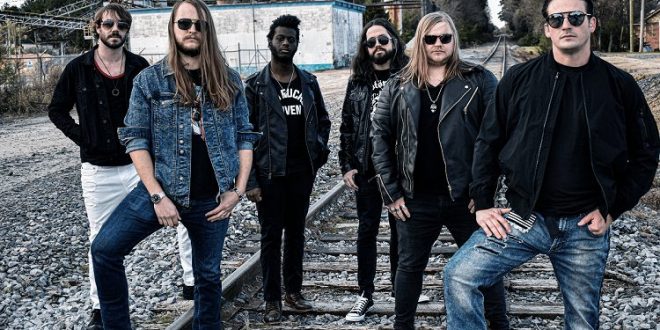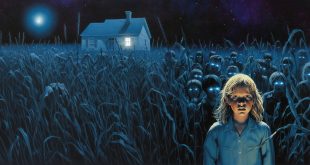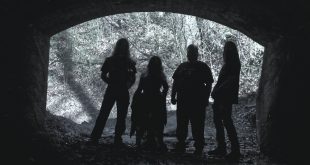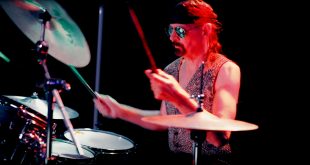The LA Maybe is a classic rock-influenced sextet based in Charlotte, North Carolina. Last summer, the band premiered their debut single “Mr. Danger” via Loudwire, featuring frontman Alvi Robinson, who was poised among four vocalists to be Brian Johnson’s potential successor in AC/DC back in 2016. Just last week, they dropped the music video to their follow-up single, “Sucker Punch.” This is the second single to precede the release of their debut album, Dirty Damn Tricks, which is slated for March 26th.
I caught up with Dallas Dwight, the band’s lead guitarist and lyricist, who was open to discussing the band’s role in the New Wave of Classic Rock movement, their new material, as well as how they are feeling amidst the impact of Covid-19.
From what I understand, you guys met with Alvi after he lost the gig as AC/DC’s new frontman. At what point did you cross paths with one another?
Alvi’s story with AC/DC was kind of separate from ours, but our time with him had only begun last summer. We went up to meet and audition him to be in our band, and it went very well. Within four days, we were back in the studio tracking the vocals for the Dirty Damn Tricks album. It started moving really fast from there, and honestly, we haven’t slowed down at all. But the genesis of the band actually came from our founding drummer, Foz, and I. We were in a Journey tribute band before, and we knew we wanted a band of our own that played original music, but it didn’t have a name yet. Over time, though, it all clicked into place as we found the right people. We have six of the best people in the band, and we’re really happy about that!
It seems to have been a spontaneous transition. I can also kind of notice that with your name, in terms of creating a hypothetical band. “So, what kind of music do you want the band to play? ‘Rock n’ roll!’ Where do you want the band to be from? ‘I dunno, LA, maybe…”
(Laughs)! Actually, with our band name, I was sitting in a Chicago airport, and I heard someone behind me say, “Yeah, she gave me the ol’ LA Maybe.” Hearing that, it clicked with me, and I found out that that expression was about when people from LA – or any place, really – wouldn’t give you a straight yes or no. At first, we thought of having the name “The LA Maybes,” with an ‘s’, for the time being, figuring something better would come up later on. But then, Foz was like, “Why don’t we just drop the ‘s’, and we never looked back.
Given all these coincidences, it turned out alright.
Yeah, 100 percent. It happened during the pandemic, too, so we all took advantage of that time. Before then, we used to play three-hour cover sets just for a little cash, but then the pandemic canceled all our shows. We’d been wanting to focus more on original material the whole time, but at that point, we didn’t have any choice. So, the pandemic pushed us to focus on our original music, regroup, make some needed changes, grow as a group, finish writing an album, record the album, and now, release the album. As terrible as the pandemic has been on everyone, we’re thankful this went the way it did.
Going back a bit, which kinds of music inspired you as a guitarist when you were growing up?
For me, it was “Welcome to the Jungle” by Guns N Roses. I was 12 years old and had a lot of free time, and when I heard that song, I knew I wanted to be in a band, so I just really took to the guitar from that point on. After the glam metal scene, I started to get into technical stuff. The person who blew that door down for me was Paul Gilbert, and after that, I never looked back. So, I think the two biggest influences that come out the most when I play are Slash from Guns N Roses, and Paul Gilbert from Mr. Big. Between those styles, I tend to find myself somewhere in the middle.
Recently, you did a playthrough of “Mr. Danger” for Guitar World. How was that for you?
That was incredible, and to have it in Guitar World was just surreal. I speak for our other guitarist, Drizzle – my partner in crime – who’s with me in the video; we both grew up reading that magazine. I can distinctly remember going to the grocery store as a kid with my parents, and while they were shopping, I’d be sitting on the floor of an aisle reading Guitar World. Just being in that publication, and reading all those the video comments, was extremely validating and awesome.
In getting The LA Maybe off the ground, do you feel that this band has become your outlet for channeling those classic influences you’ve grown up on?
Yeah, I couldn’t have said that any better, myself. My favorite part about being in this band is playing that authentic, bluesy, sloppy rock n’ roll. I’ve done a lot of other stuff in my career, from pop punk, to metal, to extreme metal, but the old school stuff moves me in a way that no other genre does. This band allows me to create music that makes me truly happy, and it makes the other guys happy as well. We’re just being as true to ourselves as we possibly can, and don’t try to fake anything. Some people love our music, some people don’t like it at all, and that’s fine. If you do like us, though, we hope you come along for the ride, and we feel it’s going to be a fun ride as well!
On the original music video for “Mr. Danger,” I saw that you pinned one of the comments that says, “Awesomeness… Just found a new ROCK band… Hard to find these days..” In your experience, what have you noticed about the presence of rock not only in this new decade, but in the past several years leading up to it?
This is one of my favorite topics to talk about. I’d say that these days, rock has gone through something of a revival. There are so many amazing bands making music today. Off the top of my head, I could name Small Town Titans, Blacktop Mojo, Joyous Wolf, Dirty Nil, Greta van Fleet… All of them fit into this movement that we call the New Wave of Classic Rock. I think what the movement stands for is that some thirty years from now, most of our rock icons we’ve come to know and love would have passed on. In thirty-something years, you’re talking about guys like Slash being 85 to 90 years old. Of course, we’d hope they’d live forever, and obviously, Keith Richards will live ‘til he’s about 900 (laughs).
It’s interesting you mention that, and this new movement feels like a long-overdue response to that period of American rock starting in the mid-2000s, when everything became especially sanitized. Nowadays, the new rock movement isn’t just about continuing to channel those classic influences, but reinvigorating its distinct vitality.
Exactly. It’s exciting to be a part of this era. Now, I have a question for you. What comes to your mind when you think of the founding fathers of rock n’ roll? How far back do you want to go?
I’d say the blues players, like Robert Johnson, Charley Patton, and Lead Belly.
Okay, now further on, when you think of the early artists that hit the big time, who comes to mind?
Hmmm… Chuck Berry, Elvis Presley, the Beatles, Rolling Stones…
Right! So, when you think about members of the Beatles and Rolling Stones who are still living, it goes to show that rock is actually very, very new, compared to the eras of classical music, which are hundreds of years old. In a way, this time is the perfect time to usher in on the new era of rock. We pay our respects to those who came before us, while continually passing the torch forward.
Yeah, and it’s unbelievable just thinking about how influential many of these bands still are!
For sure. Alongside those guys, the other bands who provide us the most influence are our peers – not so much in terms of their music styles, but the way they handle the business side of things: social media, their hustle, drive, and career trajectories. All of those things inspire us, and when we look at our situation, we see that we’re kind of arm-in-arm with these people. Some bands may view one another as competition; we don’t. We’re collaborators; we’re brothers and sisters; we’re friends – all moving toward the same goal. That goal is to keep the entire stronghold of rock going. It’s much bigger than LA Maybe, or any one band, and we’re going to do it.
Going back to your material, “Sucker Punch” has been released now. Do you feel good about your output so far, in terms of how fans have been responding to it?
Yeah, man, we’ve been blown away. Back when we released “Mr. Danger,” we were surprised by how it blew up, and how so many publications and people like you were interested in talking about our story. Of course, we’d gotten a lot of AC/DC comparisons before, which is why we chose a bit of a different direction with “Sucker Punch.” We wouldn’t want people to think we’re putting out an album where all the songs sound like “Mr. Danger;” there’s 10 songs on the new album and they all have something to offer. You’re going to hear a little bit of everything. Some people will say AC/DC, some will say Jackyl, some will say Guns N Roses, some will say Lynyrd Skynyrd, and it doesn’t even have to make sense to me. But as long as you’re enjoying it, we feel like we’ve done our job.
You’re right! So, both songs are part of the Dirty Damn Tricks album, and have a fittingly punchy sound. How did you go about the production aspect?
Oh, man, now you’re talking my language (laughs)! This whole album was done 100 percent DIY. Every note was recorded by us in our own studio, with our own hands, and on our own computers. When we were done with the recordings, we sent them to our good buddy Machine [Gene Freeman]. I encourage everyone to check him out. His list of credits is a mile long, but some of the bands he’s worked with in particular are Lamb of God, Crutch, and Crobot. We trusted him with the mixing and mastering, and he delivered epically, as he always does. Three of us in the band – myself, our guitarist, Drizzle, and our bassist, Rahsaan – all have home studios, and all the tracking was done by Zoom. With the bass tracks, for example, I’d hop on a call with Rahsaan after dinner, coffee in hand, sit there, and he’d say, “Alright, what do you think about this?” Then, he’d send me the track, and I’d put it in the song on my end. We’d do that remotely, using Dropbox to send each other files, which is awesome, and otherwise wouldn’t have been possible in the past.
But the fact that we were DIY saved us a small fortune. Depending on which studio we’d use normally, I’d say we saved around 10 to 30 thousand dollars, and what’s good is that we have unlimited time. I can record a solo and say, “You know what? This sucks. I’m not feeling this today. Let’s come back to it tomorrow.” If you try that in the studio, you have producers and engineers working on the clock, and if you can’t deliver, the solo’s going to suck, and you’ll just have to make do. With this album, though, we had so much fun; we were able to experiment by adding congas, shakers, and triangles, and we even have a gospel choir on one of the songs. On another song, we have gang vocals, where all of us would gather around the mic and sing at once. There’s tons of guitar and keyboard layers, which aren’t uncommon in a song like “Sucker Punch, or even “Mr. Danger.” We have seven, eight, nine, ten guitars all playing at the same time, going in and out of each other, and all kinds of stuff. So, that’s one thing we do which is different than all our rock forefathers, who are otherwise raw and stripped down – just a few guitars, bass, drums, and that’s it. Our sound features a lot of layers that add up to a thick, solid presentation, which we all gravitate toward. I love adding little extra things into the verses and choruses. This era has definitely given us a lot of options. We can say, “Okay, are we gonna keep this part, drop this part, or switch this part up somehow,” and when every part is together, nothing is played exactly the same. That gives us a really wide sound, and we leverage the fact that we have two guitar players. It’s a little more calculated, intricate, and more choreographed, in a way.
Yeah, it does seem like a really involved process. How are you feeling with the way Covid has impacted these circumstances? Are you not as anxious about it, given how things move at a generally slower pace down south?
Yeah, I would agree with that. One thing I notice is that down here in Charlotte, we’re definitely more spread out, compared to New York or New Jersey, which have more densely populated areas. As far as how I’m feeling, I guess it’s a matter of working as I normally would, while staying as safe as I can. I thrive working by myself. There are times where I can’t look away from my guitar or my computer, because I’m so in the moment, being able to come up with tons of new ideas. I really took advantage of being able to work from home, to rest, recharge, and start new projects, including this band. Like I’d mentioned in the beginning of this interview, the band really works in our favor – we stepped back and readjusted, and now we’ve come back swinging. We were already known locally, but more so as a covers/variety band, so we wanted to banish that stigma, and it seems to be working for us.
Would you say, as a result of that, you guys have become much stronger, both as band members and as friends?
Oh, 100 percent. We’ve got all the right members in the band. Thankfully, everything has worked out for all the reasons they should have, so we’re all really thankful for that.
Similarly, with the direction your career has gone in, what have you learned?
I would say I’ve learned to work with these guys as a unit, and as a team. We’ve all learned to grow and work together more closely, relying on each other to pull our own weight. Previously, in other bands I’ve been in, there were instances where I and some of the other members do all the work, while the rest wouldn’t contribute anything. Now, I’m in a band with six people, and all the work is equal between us. It’s easier to see the difference because we’re talking with each other every day, and when everyone moves in the same direction, things just click into place. Not to say we won’t have challenges, but I definitely have confidence that we’ll be able to get through this.
Lastly, anything you’d like to say to your fans?
I’d like to say two things. Thank you for reading this interview, and for listening to our music. We really appreciate every single one of you. The second thing is, if you’re not a fan yet, and would like to learn more, www.lamaybe.com is the place you need to go to. It will show you all our socials, mailing list, and merch store. In fact, when you sign up on our mailing list, you’ll get 10 percent off merchandise. It’s super easy; just scroll to the bottom. That’s the best place to keep up with what we’re doing. If anything, just google us, and we’ll pop up.
The LA Maybe Socials:
 Music Existence Because of Music, We Exist
Music Existence Because of Music, We Exist




